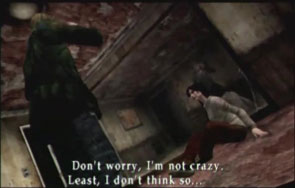
With the Silent Hill HD Collection being lambasted by fans and critics (my review now available here!), I thought I’d take a moment to discuss exactly why I feel it was so important for the original voice acting of the games (Silent Hill 2 specifically) to be retained. And it isn't just a matter of personal preference based on my familiarity with the original actors; although, that is definitely a contributing factor.
Critics tend to make a simple equivocation fallacy when describing the voice acting of Silent Hill as "awkward" and then calling it "bad". But "awkward" does not necessarily mean "bad". In fact, the awkward voice acting of Silent Hill 2 is actually a benefit to the game's narrative and mood. This is something that should be apparent to anybody who is actually paying attention to what's happening in the game.
Let us first take a step back and look at the design principles that went into Silent Hill 2.

James begins to doubt his own mental stability
Silent Hill 2 is a particular kind of horror game. It differs from other horror games at the time - such as Resident Evil and even its own predecessor Silent Hill - in that it is a very emotional brand of horror. The horror doesn't come so much from being "afraid", but rather, from being depressed, confused, and unsure of what is going on around you. Silent Hill 2 is a very dark and gloomy game, and definitely deserves its "M for Mature" rating with its story and themes alone. Team Silent accomplishes this by immersing the player in decrepit environments and introducing elements of surrealism to the game's reality. They then supplement this by slowing breaking down the foundational pillars of what the main character thinks is real, and then forcing the character and the player to wonder whether their own senses can be trusted.
[More]
56dfd391-12ca-465c-a1b2-248e2df8691e|10|5.0
Tags:Silent Hill, Silent Hill 2, Silent Hill HD Collection, James Sunderland, Angela Orosco, Eddie Dombrowski, Konami, Team Silent, PS2, PlayStation 2, horror, depression, equivocation, fallacy, voice acting